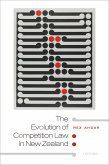In the 1970s, the Federal Trade Commission had embarked on an activist consumer protection and antitrust agenda which resulted in severe public and congressional backlash, including calls to abolish the agency. Beginning in 1981, under the direction of Chairman James Miller, the FTC started down a new path of economically-oriented policymaking. This new approach helped save the FTC and laid the groundwork for it to grow into the world-class consumer protection and antitrust agency that it is today.
The Regulatory Revolution at the FTC examines this period of transition in light of continuing debate about the FTC's mission. Editor James Campbell Cooper has assembled contributions from leading economists and scholars, including many of the central figures in the Miller-era Commission and today's FTC, who provide a comprehensive and revealing story about the importance of economic analysis in regulatory decision-making. Together, they foster a crucial understanding of the evolution of the FTC from an agency on the brink of extinction to one widely respected for its performance and economic sophistication.
Dieser Download kann aus rechtlichen Gründen nur mit Rechnungsadresse in A, B, BG, CY, CZ, D, DK, EW, E, FIN, F, GR, HR, H, IRL, I, LT, L, LR, M, NL, PL, P, R, S, SLO, SK ausgeliefert werden.









